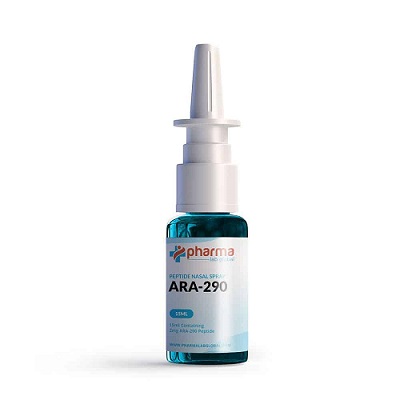What is ARA-290?
ARA-290 is an erythropoietin-derived peptide that has been the subject of various studies. It’s known to potentially reduce HbA1c, enhance cholesterol levels, manage neuropathic pain, aid in wound repair, and provide anti-inflammatory benefits.
Research Insights on ARA-290
Protecting Tissue and Promoting Health
In animal studies, ARA-290 has demonstrated the ability to reduce macrophage activation, which in turn supports the longevity of islet cells—critical cells for regulating blood sugar. This is important because islet cells, unlike exogenous insulin, can offer more natural regulation. While transplanted islet cells tend to deteriorate quickly, ARA-290 shows promise in extending their functional lifespan.
For those involved in research, ARA-290 peptide nasal spray for research is emerging as a valuable tool to explore the full potential of this peptide in preserving islet cell function.
In addition, ARA-290 has been linked to reduced inflammation, enhanced tissue protection, and faster wound healing. Studies in animals suggest that it could lower mortality rates and accelerate tissue repair by promoting faster recovery from injuries.
Disease Prevention Potential
ARA-290 has also shown potential in protecting endothelial cells. Research involving animal models suggests that ARA-290 promotes the growth and repair of blood vessels by stimulating endothelial colony-forming cells (ECFCs), a critical component in maintaining vascular health. This could be significant in preventing retinal ischemia, a leading cause of blindness in many developed countries.
Other studies have highlighted how ARA-290 enhances the migration, growth, and health of fibroblasts derived from endothelial cells, particularly in parts of the vasculature in need of repair.
Future of Medicine
In the world of medicine, ARA-290 holds the potential to redefine protein synthesis, tissue repair, and hormone production. Its therapeutic applications could revolutionize how we approach treatment for a variety of conditions, ranging from neuropathy to chronic inflammation.
Immune System Support
ARA-290 may also play a role in boosting the immune system. Clinical research indicates that the peptide can bind to the tissue-protective receptor (TPR) present on various immune cells—such as mast cells, macrophages, dendritic cells, and lymphocytes. By activating TPR, ARA-290 appears to reduce the release of proinflammatory cytokines like IL-6, potentially making illnesses less severe or preventing them altogether.
Pain Relief Benefits
ARA-290’s effect on neuropathic pain is particularly promising. Studies have shown that by targeting the innate repair receptor (IRR), ARA-290 can reduce inflammation and relieve pain associated with conditions like multiple sclerosis, diabetes, nerve injury, and amputation. Further research in animals suggests that ARA-290 could significantly improve pain relief by promoting the regeneration of tiny nerve fibers often lost due to autoimmune diseases.
Researchers are optimistic that high doses of ARA-290 nasal spray may offer long-term pain relief for nerve damage caused by chronic conditions such as diabetes, thyroid disease, celiac disease, and HIV.
Back to Homepage
Summary
ARA-290 has captured the interest of researchers due to its unique ability to control nerve pain and modulate the immune response. Its potential to stimulate wound healing, protect blood vessels, and manage inflammation has placed it at the forefront of innovative treatments. The peptide is currently being investigated for its neuroprotective effects, particularly in treating conditions like diabetic neuropathy and sarcoid neuropathy.
Moreover, it’s being tested for its potential to treat systemic lupus erythematosus, MS, HIV, celiac disease, and more. Patients with inflammatory bowel disease (IBD) are also showing growing interest in ARA-290 as a possible disease-modifying agent. The future looks bright for this peptide, offering hope to many with chronic pain and inflammatory conditions.

